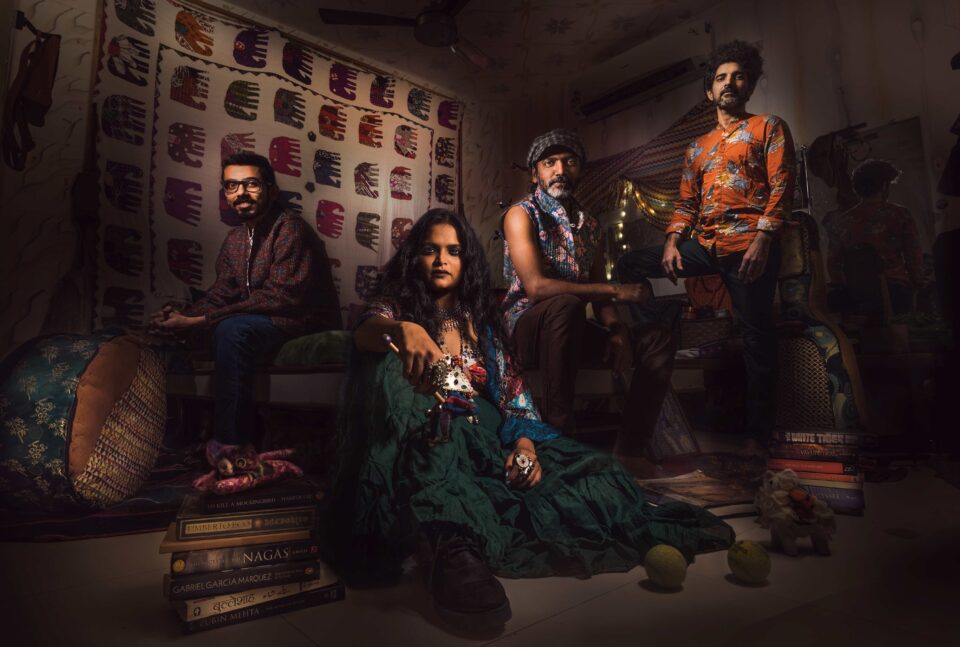Globe-trotting band The Tapi Project have a favorite memory attached to their new song “Varsaad.” In 2022 on their Europe tour, they performed at a jazz festival in North East Bulgaria.
Playing the final set of the night, it began raining just as the Surat band had explained how the song is a beckoning call to the rains which start the monsoons in India. Guitarist Yogendra Saniyawala says, “There was thunder and lightning and it was absolutely crazy. It was a first for a lot of people and I think the highlight of their visit.”
“Varsaad” was originally created in Japan, though. Saniyawala says, “Me and Swati [Minaxi, vocalist] were there for a long festival. We performed at different places and started jamming for a new song. Since she was missing monsoons a lot more than me, she began singing ‘Shravan aaviyo/Varsaad laaviyo.’ It has gone through many iterations.” Among the past versions of “Varsaad” includes a 2018 performance on video series Music Mojoon Kappa TV, which included Filipino percussive elements.
This studio version of the song has an atmospheric, mind-bending quality that is The Tapi Project’s signature style, also heard in previous singles like “Mehsoos.” Swati Minaxi’s vocals soar as she draws out the melodies over fluid basslines by Biju Nambiar and roomy drum work by Gaurav Kapadia.
The additional push for this comes from Raghu Dixit, who adds a Kannada verse written by Kiran Kaverappa. Saniyawala recounts that they had jammed with a Malian act Samba Touré in Switzerland and found they “added a great flavor with their native language.” He adds, “Since then, we knew that this song somehow has a space for a language other than Gujarati.” Dixit was a natural choice because of his powerhouse vocals and they met him at Mahindra Kabira Festival in Varanasi last year, which started the conversation.
Dixit was prepping the release of his own album Shakkar, which gave The Tapi Project a very small timeframe to record. Saniyawala says, “We got about two hours to figure. We went with a melody in mind, he felt it was a bit floaty. We gathered together, just discussing and listening to the song, he just came up with the melody that he’s singing. After he sent the vocal scratch, we redesigned and rearranged the entire backing arrangements, the guitars, the keyboards, the drums, everything on top of his vocal tracks, and then mixed it with the rest of the track. During the entire process, he was unbelievably graceful and supportive.”
The band’s advisor Aishwarya Natarajan – founder of the music consulting firm Indianuance – chimes in on the call to say how accommodating Dixit was. “He almost didn’t want to disturb the vibe [of the band]. He said, ‘Look, I’ll do it but if you don’t like it, don’t feel compelled to keep it.’” She adds that the collaboration between The Tapi Project and Dixit might even take them on stage together sometime soon.
“Varsaad” also comes with a music video shot at a mud house called Valmeekam in Wayanad. The artwork was made in-house, true to The Tapi Project’s ethos. Minaxi made a painting and Kapadia took pictures of each band members’ eyes and it’s all come together in the song cover. Minaxi says the song didn’t necessarily inspire the painting, since the latter had already existed.
If “Varsaad” and all their releases so far are anything to by, The Tapi Project are a band to watch live. There’ll be plenty more of them in the Indian music festival circuit in the coming months, including the Serendipity Arts Festival in Goa.
Saniyawala says, “We live on stage. We are no different off the stage or on the stage as people, but on the stage is when our storytelling takes the centerstage. Swati throws colors and flowers on stage during ‘Mehsoos.’ Some gigs, you’ll see lots of plants on stage, or dry leaves. Sometimes, it’s darkness with LED candles. She runs off the stage, we all run off the stage as the song ends. It just comes naturally to us. The stage is when we become who we truly are.”
Off stage, there are a few studio moves also in the works, according to Natarajan. The band will collaborate with a London/Berlin-based orchestra at a residency. “It’s got a very diverse, open theme and the orchestra is not so traditional. They’re the kind to embrace new thought and fluid structures, alll of which The Tapi Project very much stands by themselves,” Natarajan adds.





